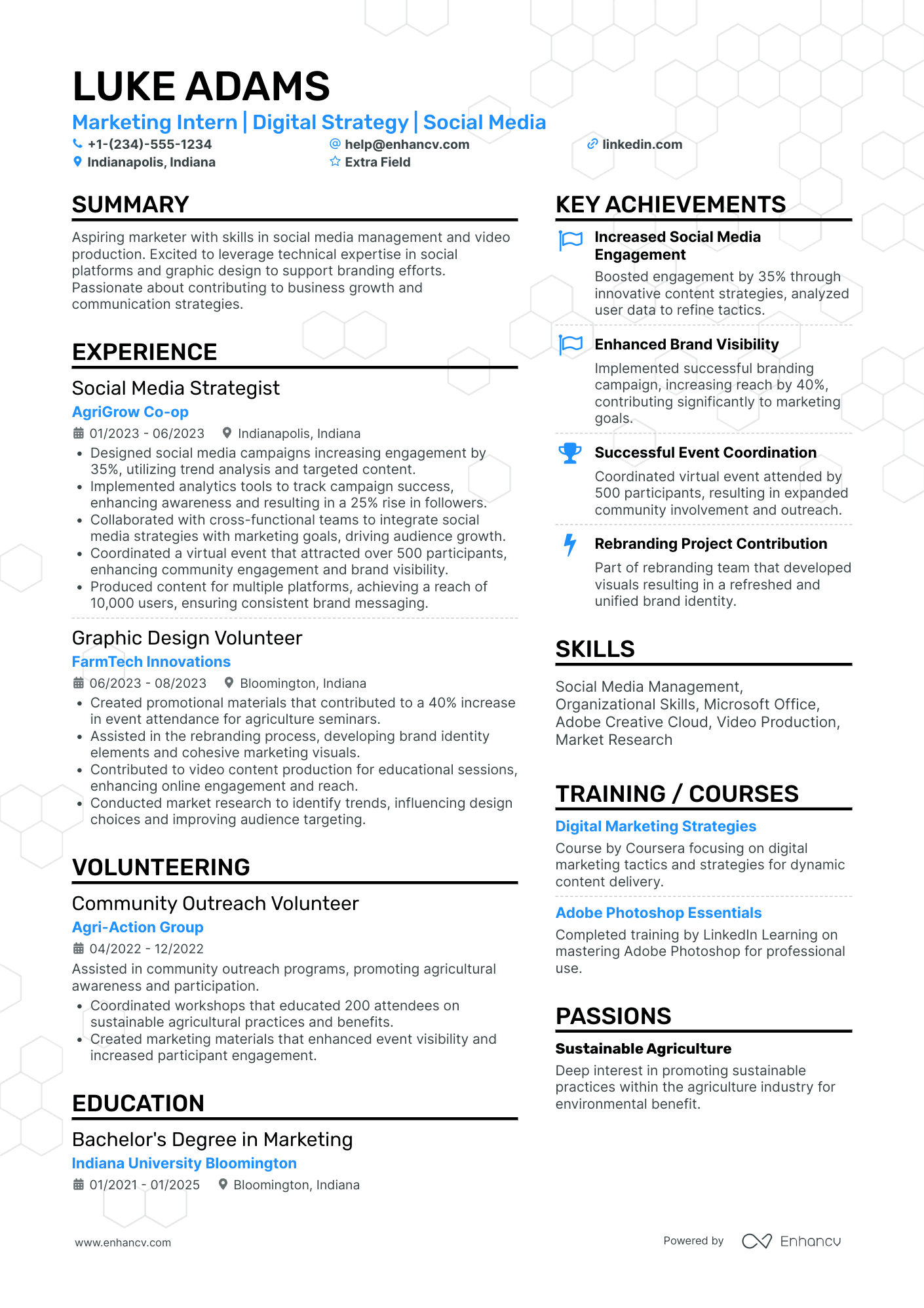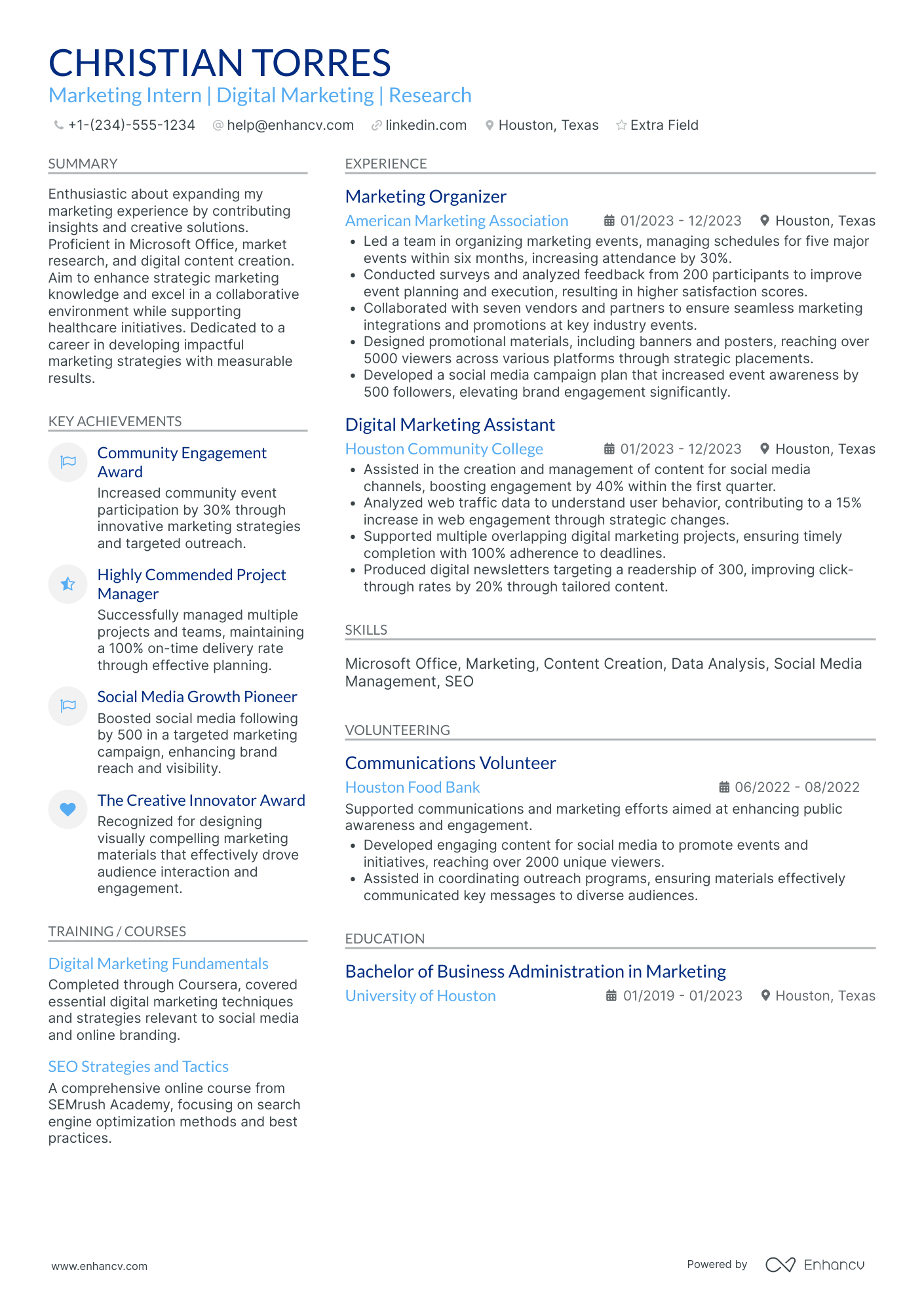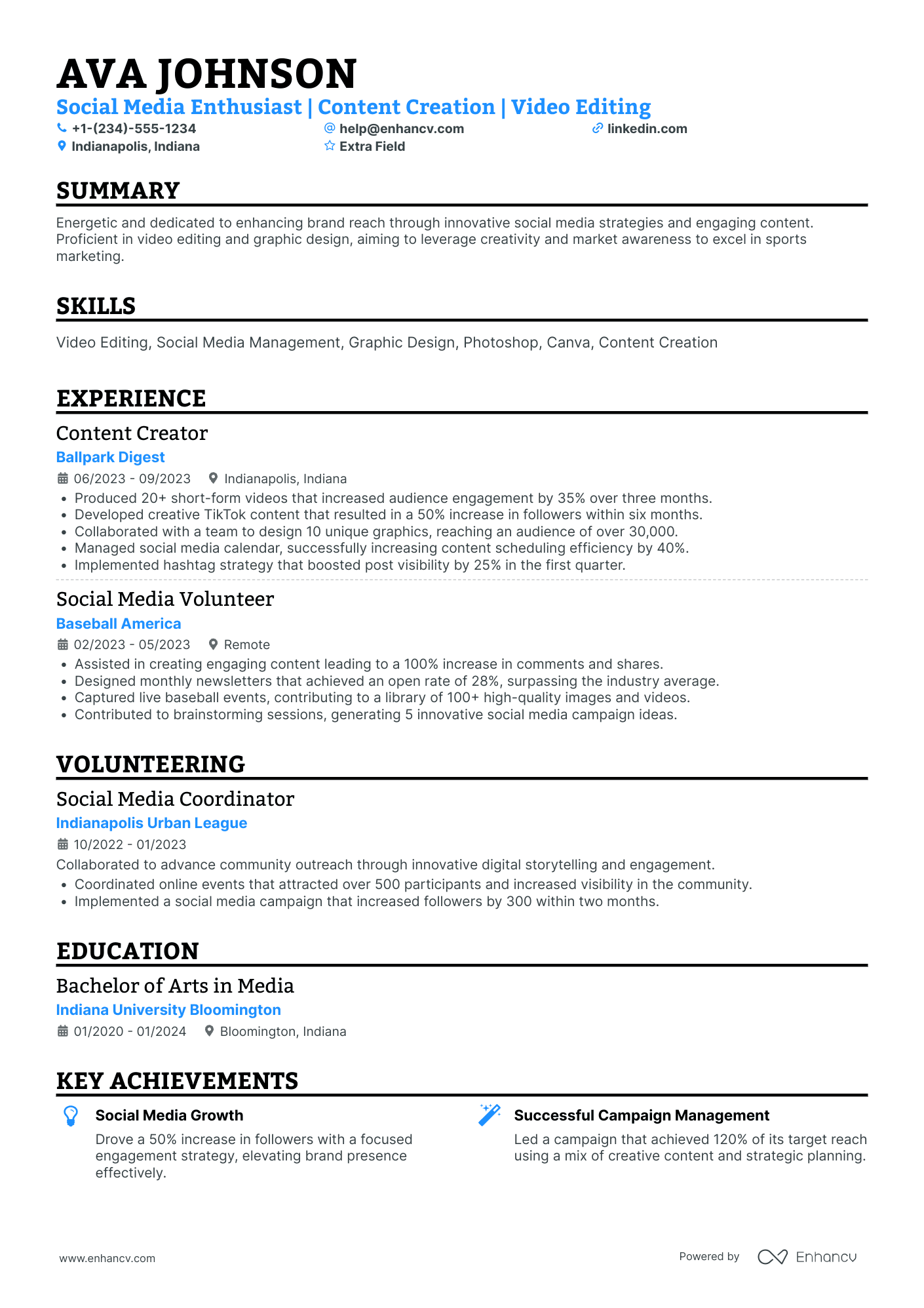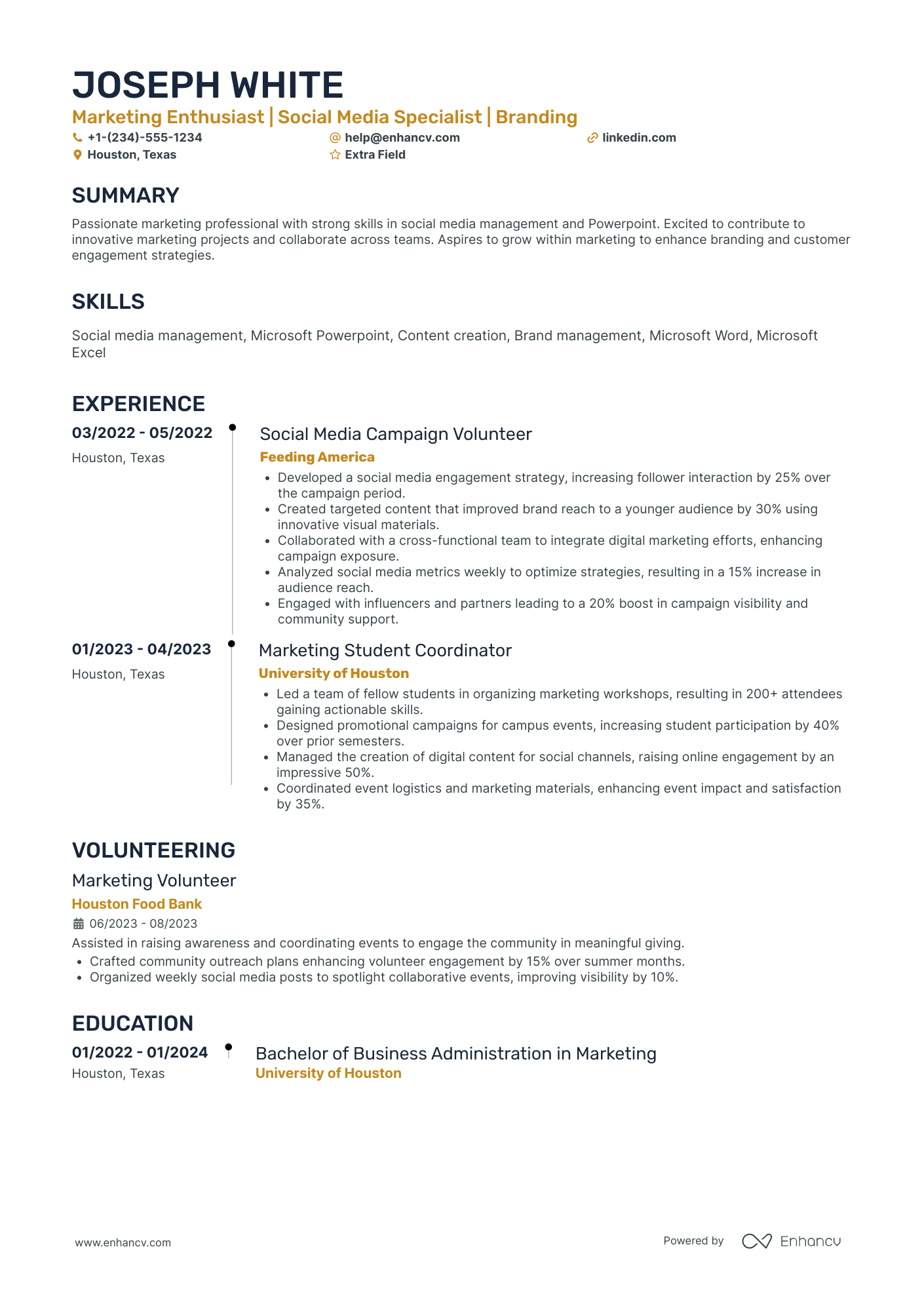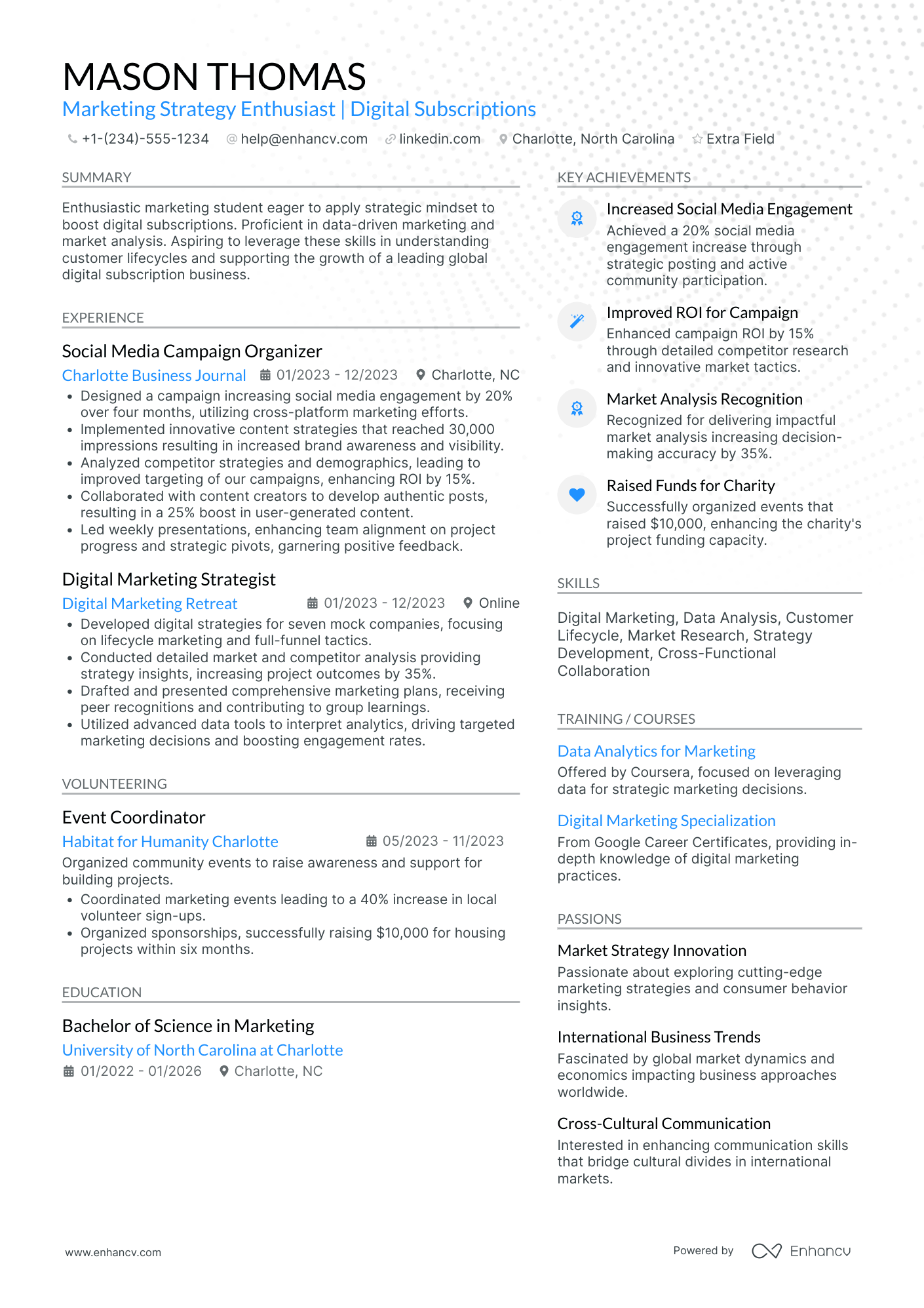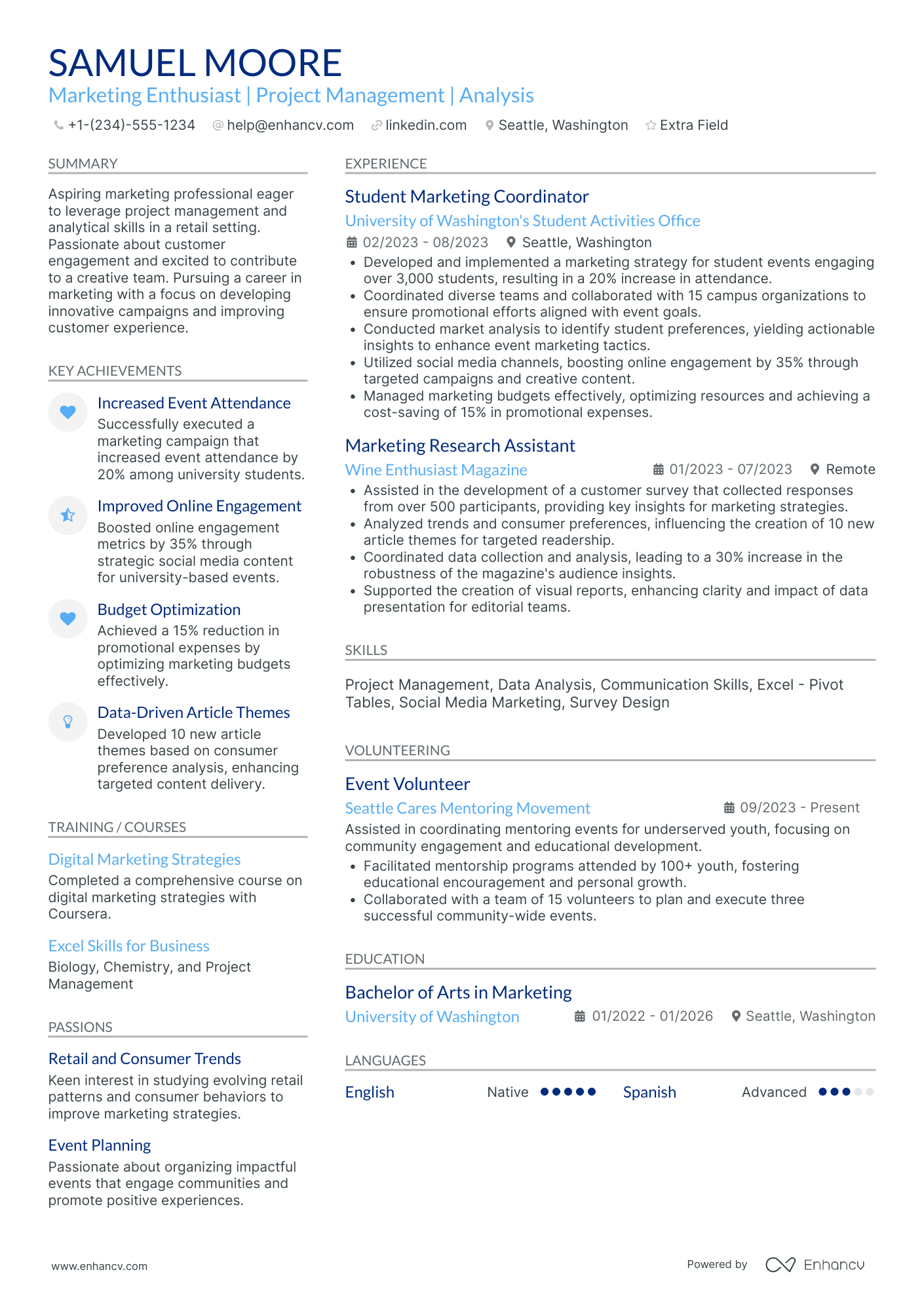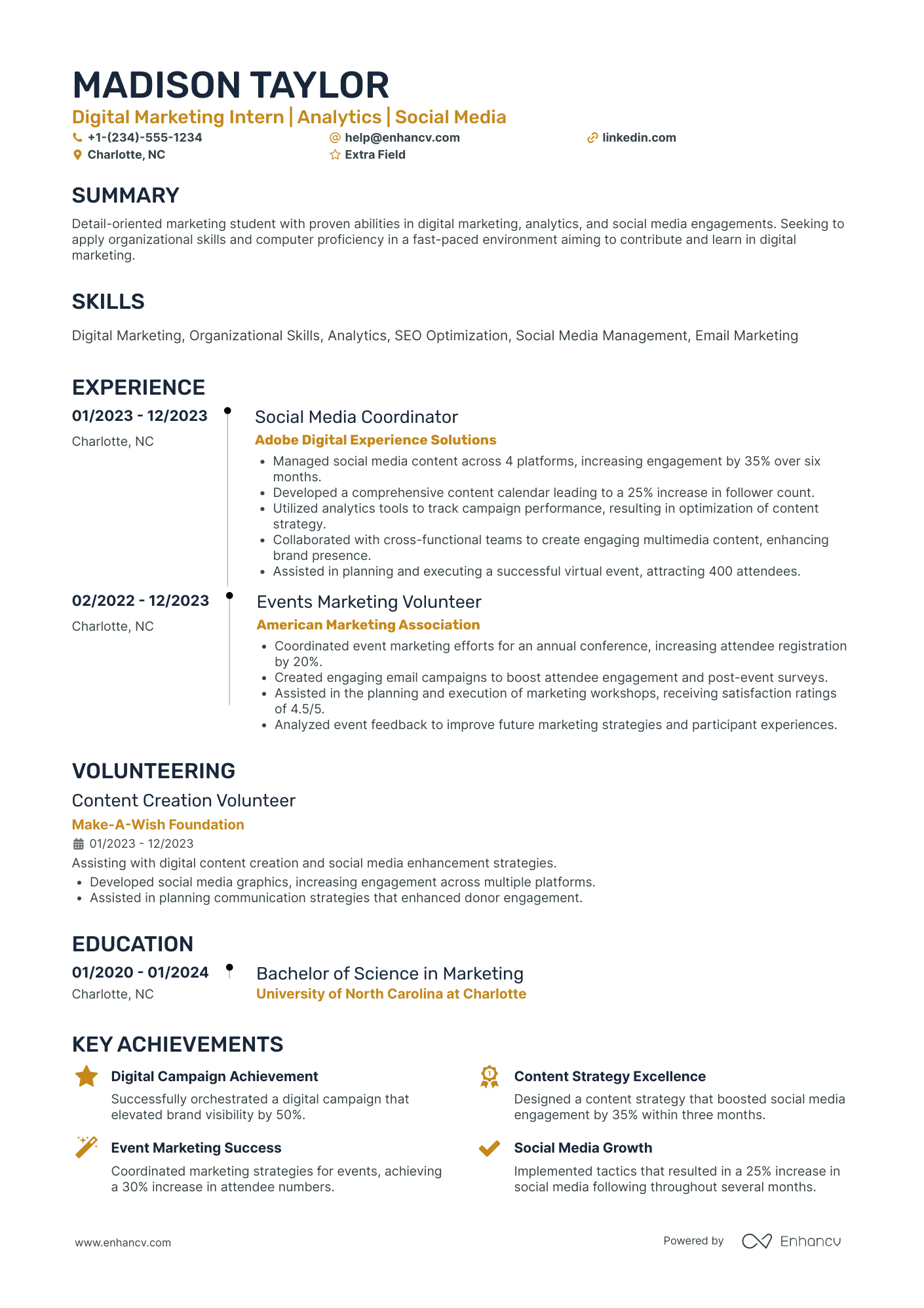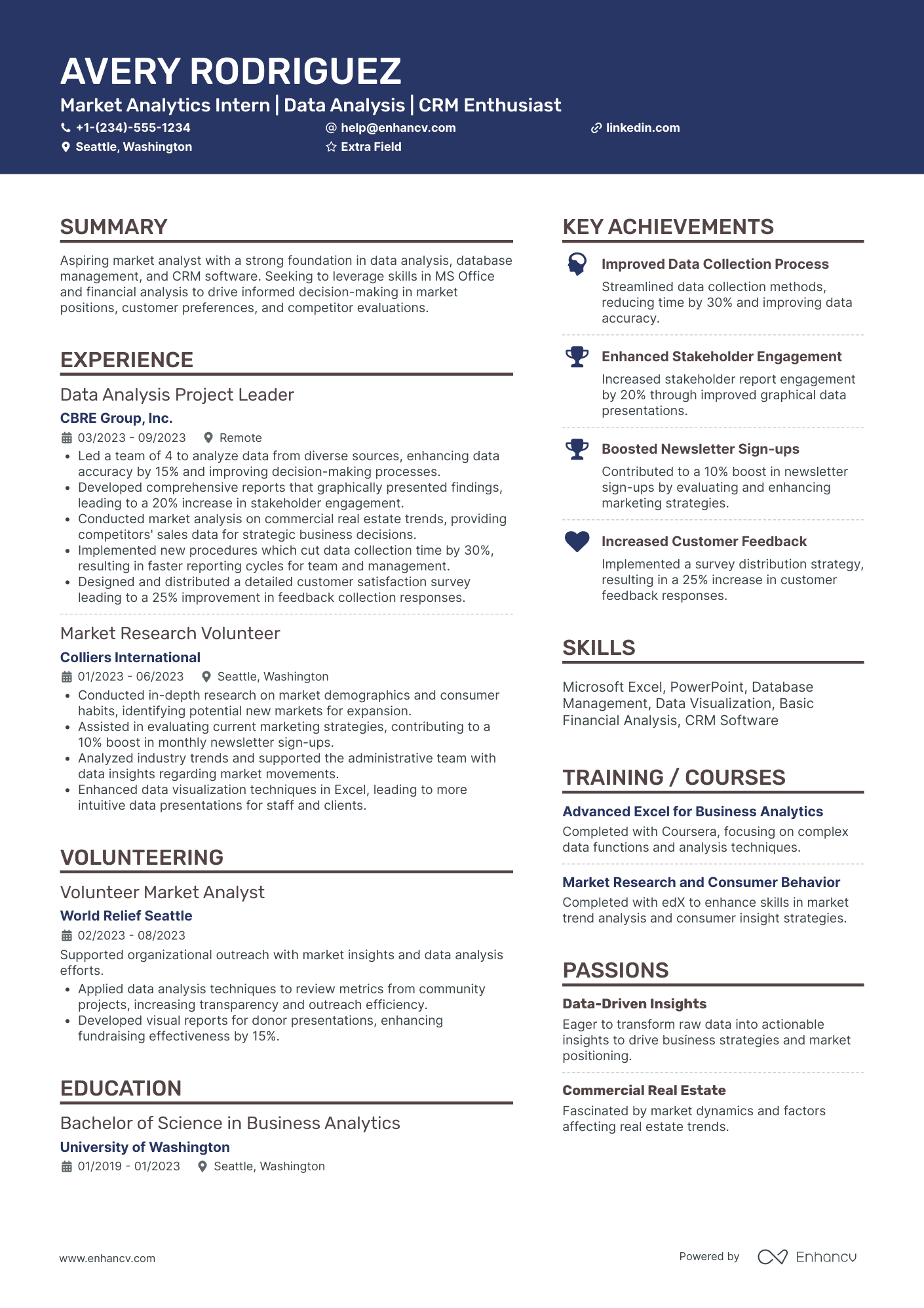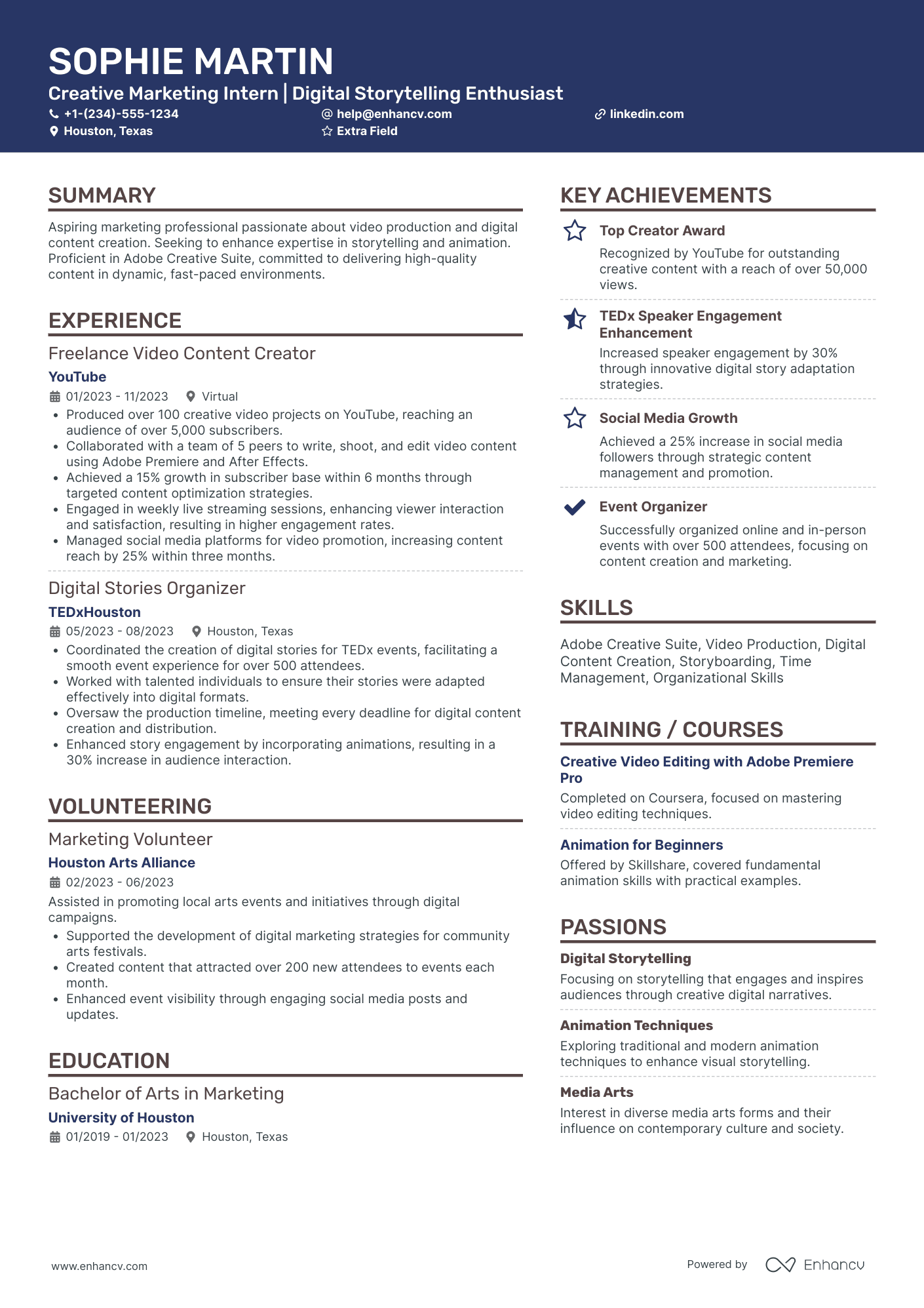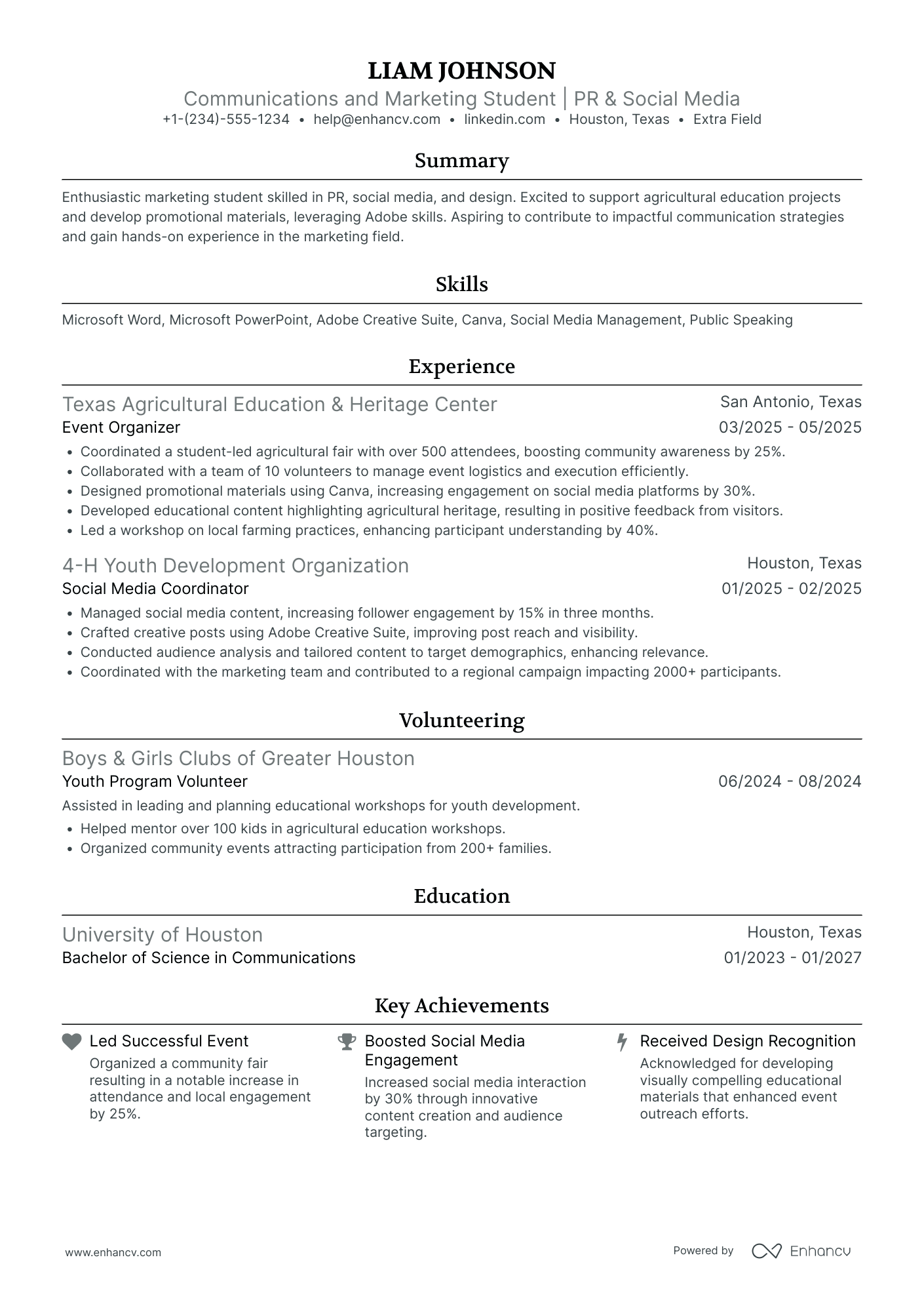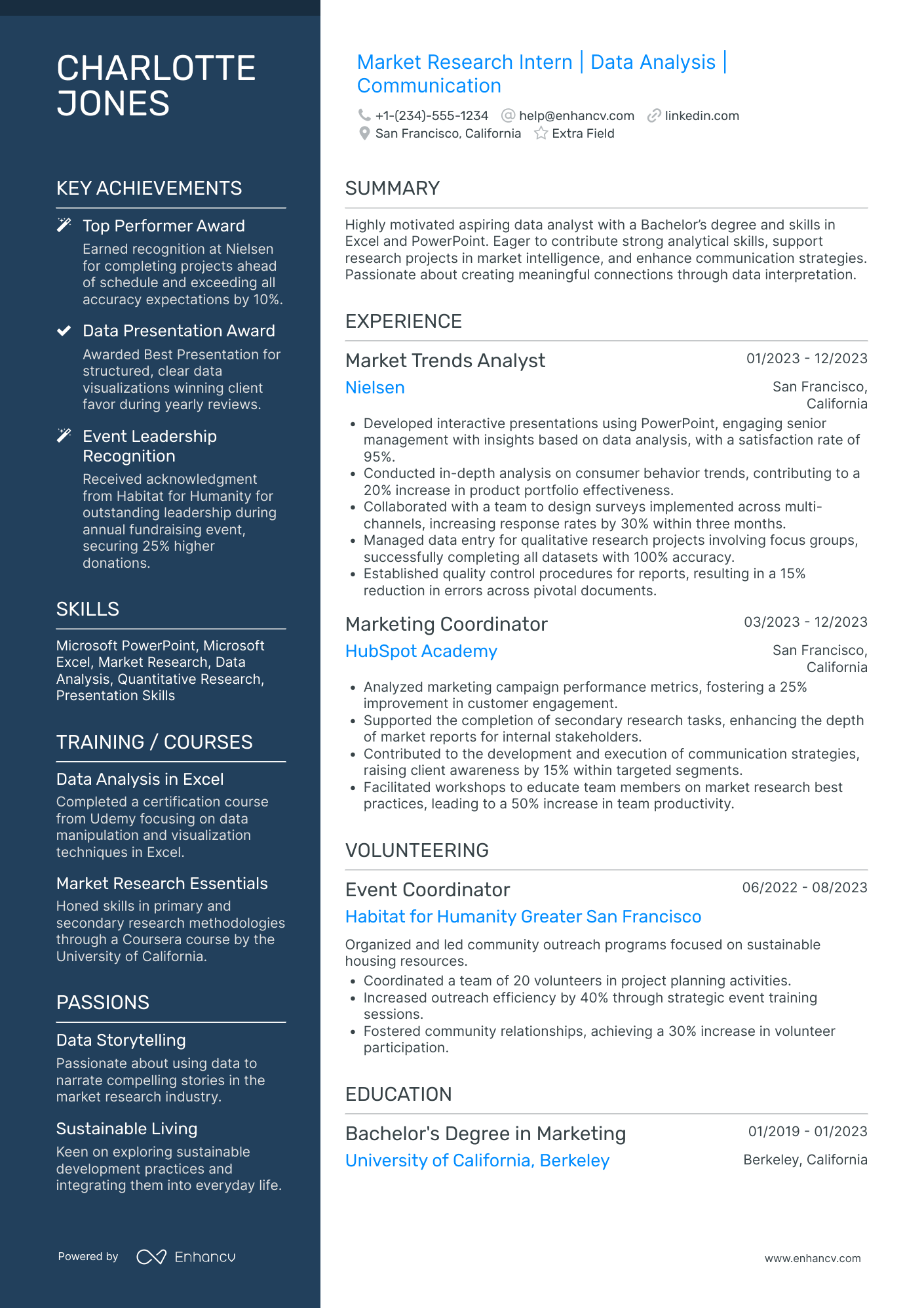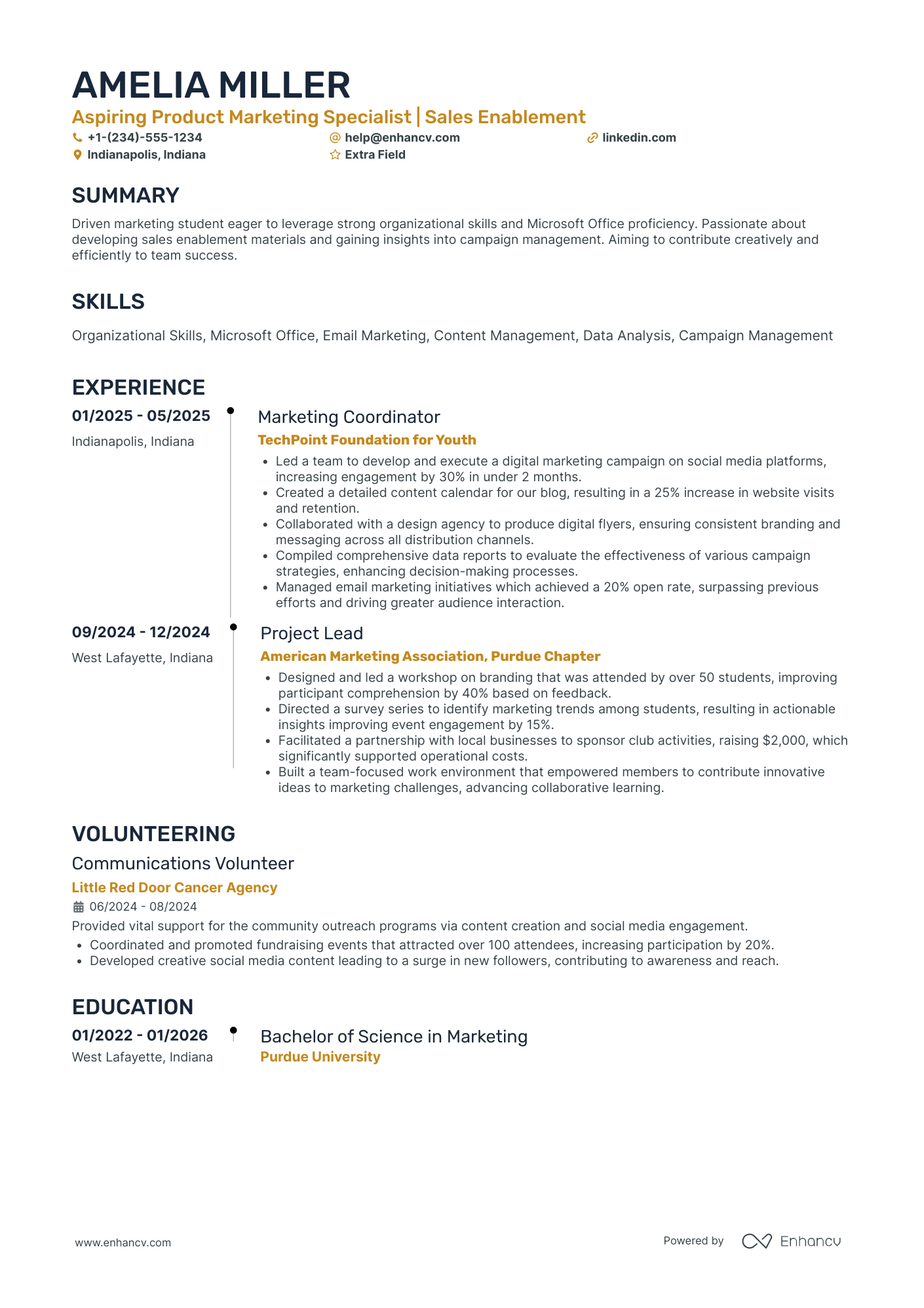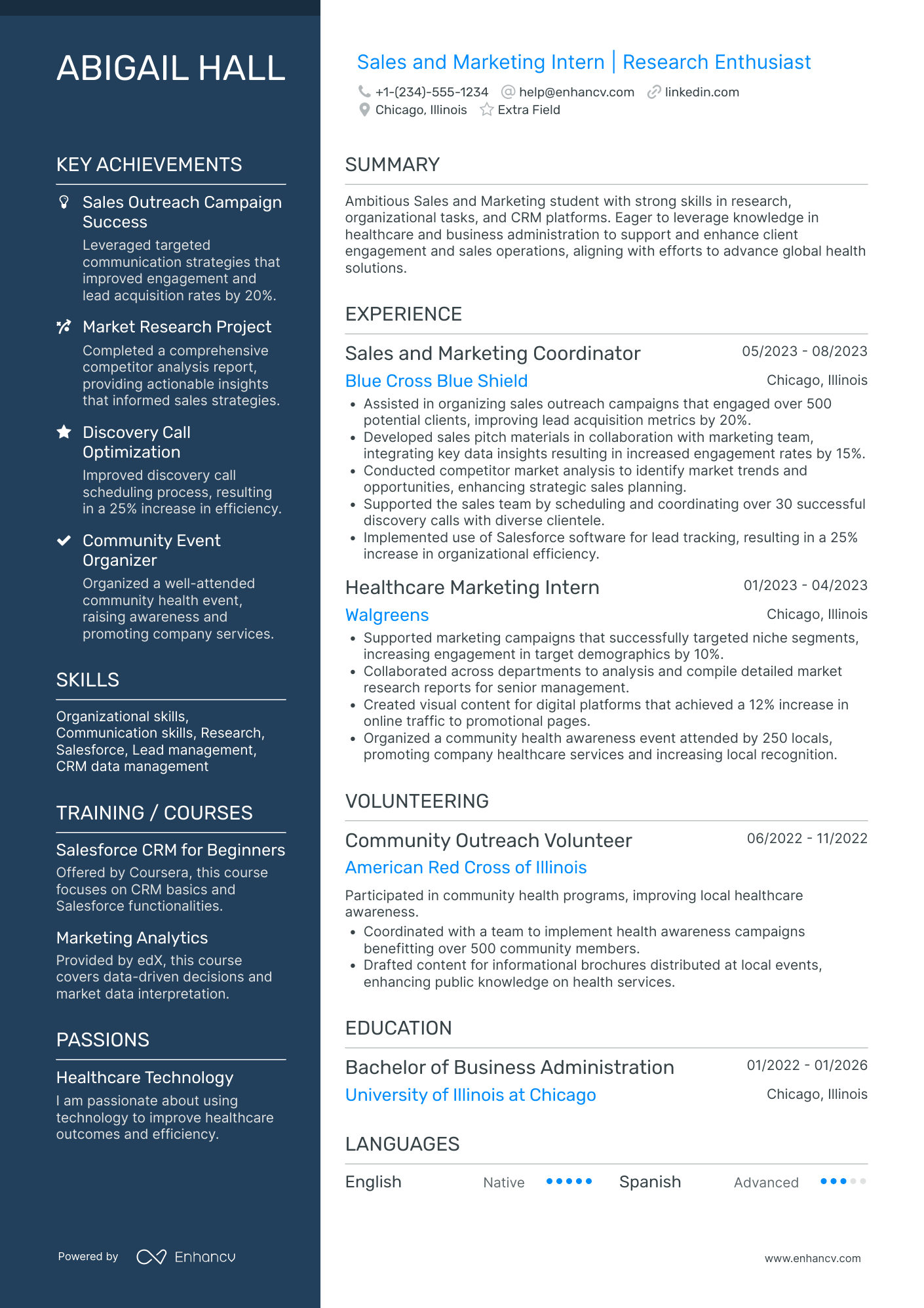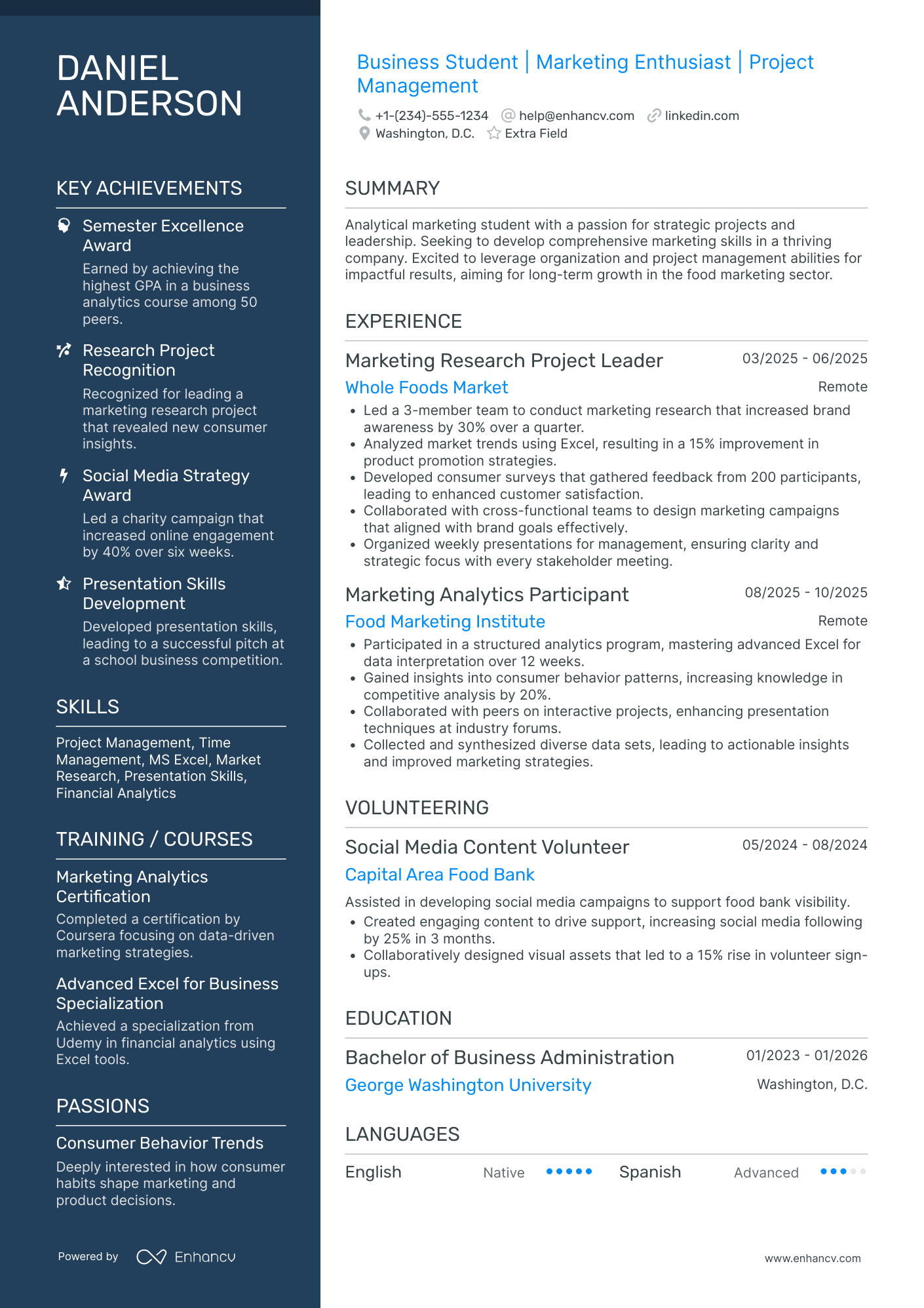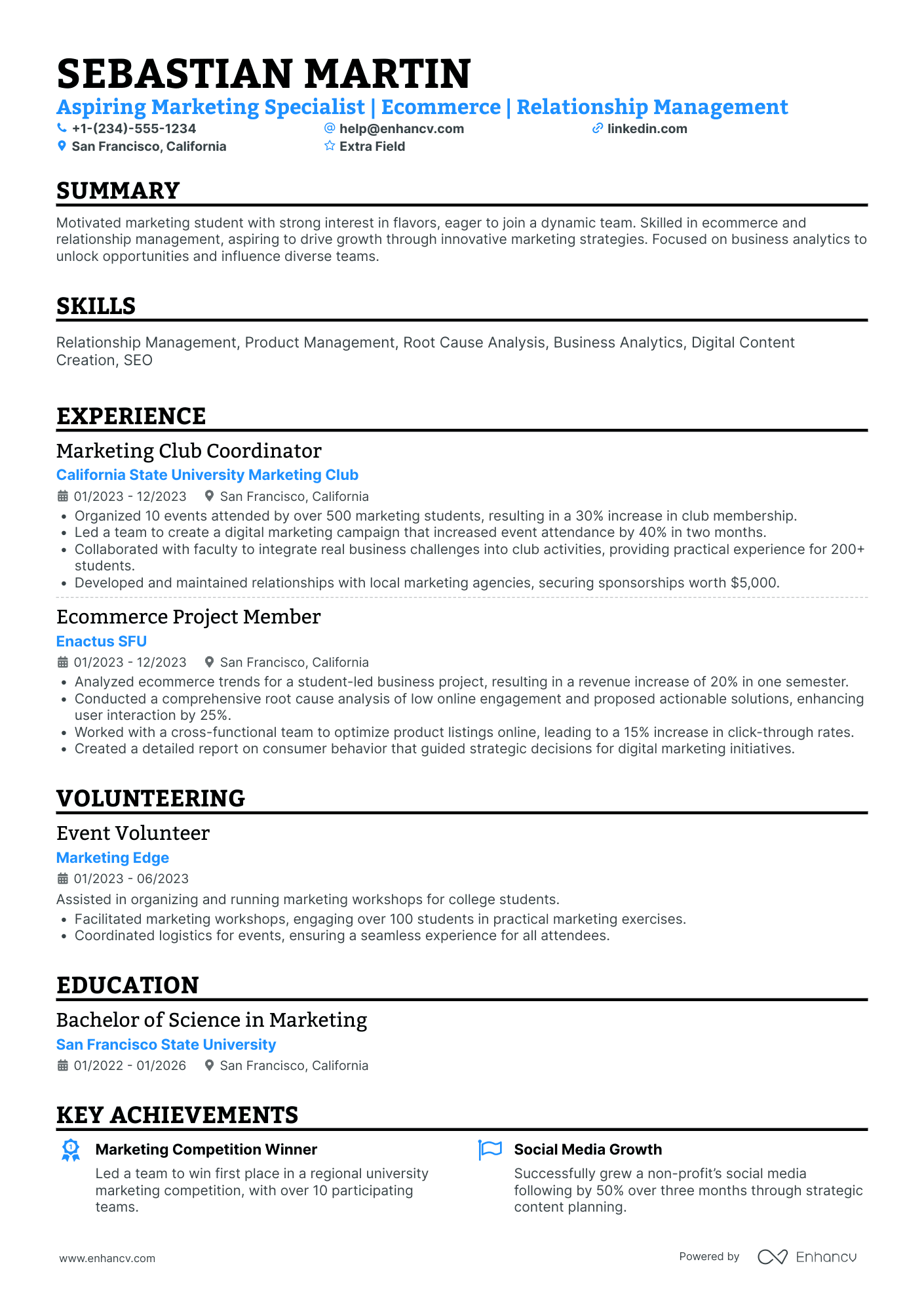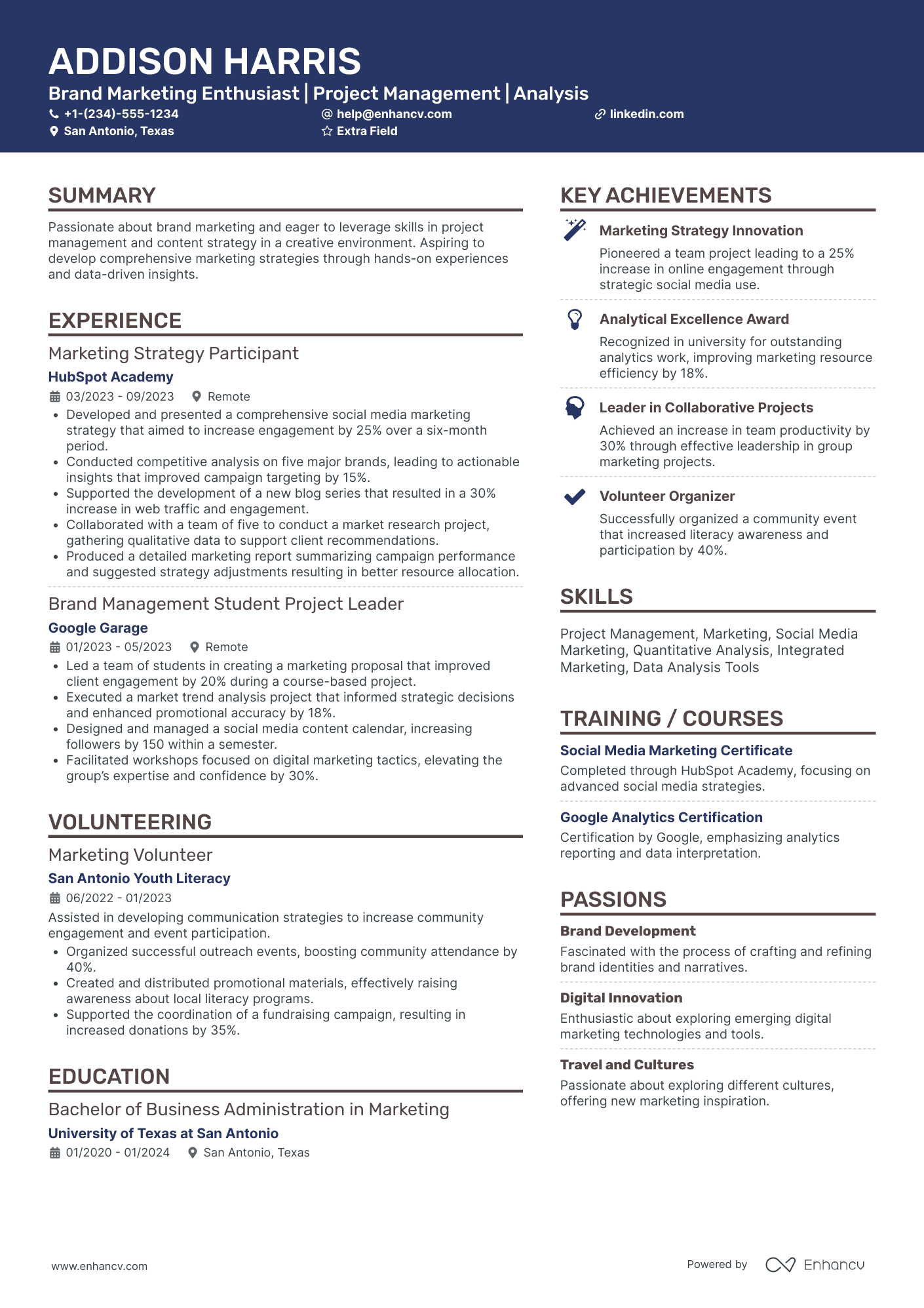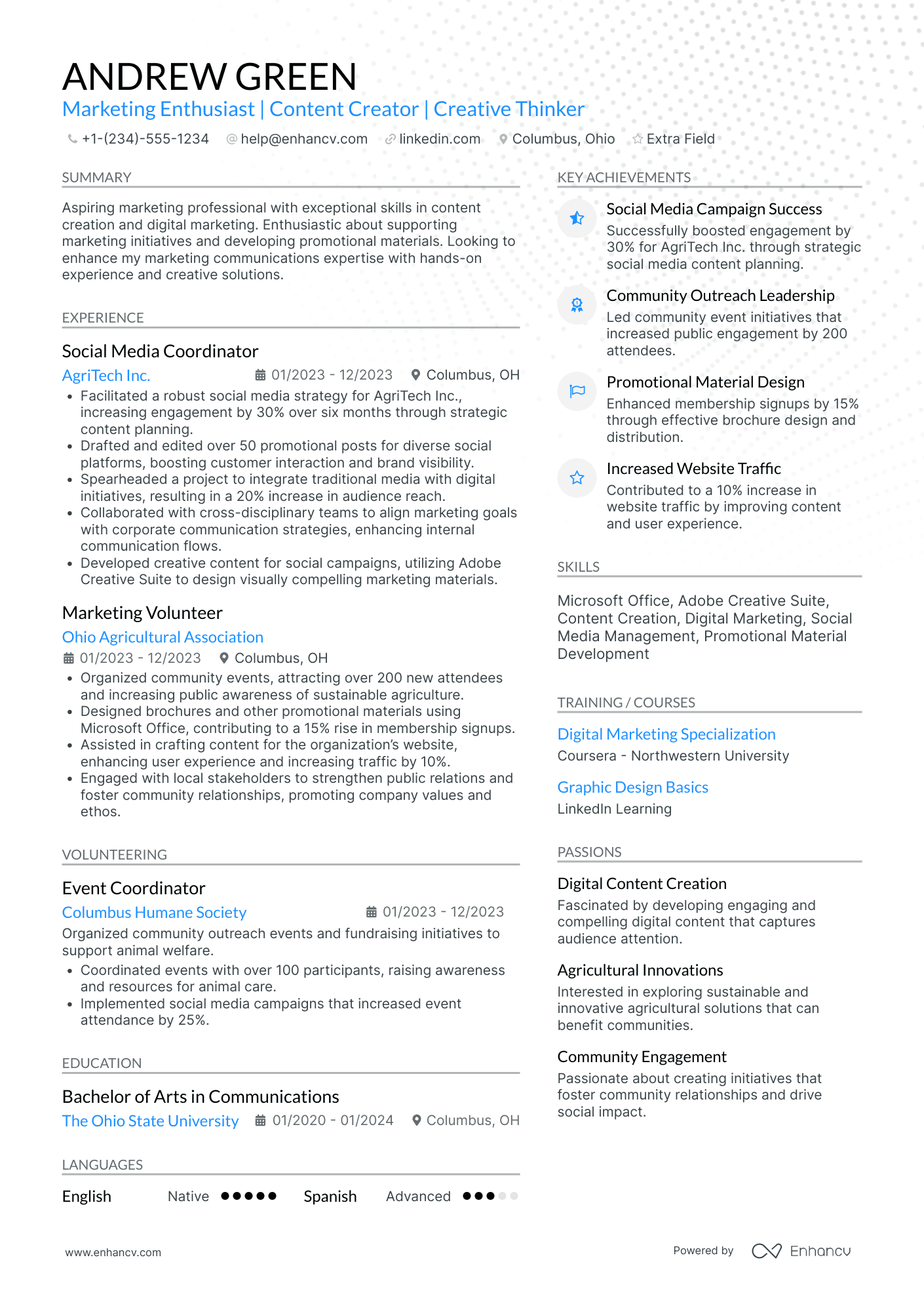Recent insights from GetApp reveal an exciting trend for marketing newcomers in small and medium-sized businesses (SMBs). Despite the rapid rise of artificial intelligence, the demand for marketing interns remains strong. What's more, a whopping 71% of SMBs are prepared to offer higher salaries to novice marketers who provide fresh insights on current marketing trends. This is a prime opportunity for up-and-comers to make their mark—and possibly their money—in the evolving digital marketing landscape.
Great news—AI isn't taking your job anytime soon! But here’s the catch: if you’re on the hunt for a marketing internship, you need a resume that truly stands out. Make sure it highlights your knack for keeping up with the latest trends and your eagerness to sharpen your analytical skills.
This guide is your secret weapon. It’s packed with resume-building tips, including:
- The optimal resume format for digital marketing interns;
- How to showcase your experience, even if it’s limited;
- Tips for weaving in impactful keywords and numbers that make your resume pop;
- Key skills to highlight that will make your intern resume shine;
- Crafting an objective statement that captures attention.
Looking to explore other opportunities? Check out our collection of digital marketing resume examples below:
- Marketing Assistant Resume
- Marketing Specialist Resume
- Digital Marketing Resume
- Digital Marketing Consultant Resume
- Entry-level Digital Marketing Resume
- Marketing Manager Resume
- Social Media Intern Resume
- PR Intern Resume
- Intern Resume
- Marketing intern Cover Letter
The right format for a marketing intern resume
Internships offer a fantastic opportunity to sharpen your skills and gain valuable hands-on experience in your chosen field. What's more, with 60% of internships being paid and most interns landing a permanent position after their programs, the stakes are high and the rewards even higher.
Naturally, you're eager to secure that coveted marketing internship! But first, you need to craft a resume that showcases your talents like a well-executed marketing campaign, highlighting your strategic thinking, creativity, and data savvy.
Let’s start with the structure of your resume. For marketing interns, the hybrid resume format is typically the best choice. It allows you to underline marketing-specific skills that are crucial for the role, while also detailing your educational background and any internship experiences in a clear timeline.
Here are the two other most popular resume formats:
- Reverse-chronological resume: This format lists your work history in reverse chronological order, which makes it easy for hiring managers to see your most recent job experiences. However, when you’re joining the workforce for the first time, this format can highlight your lack of experience.
- Functional resume: It focuses on your skills and abilities rather than your chronological work history. It’s beneficial if you're new to the field or have gaps in your employment because it underscores what you can do rather than when you did it. Still, some hiring managers might not prefer this format as it can seem like you’re hiding a lack of experience or inconsistent employment history.
Make a decision based on your experience (those summer jobs also count!) and then consider using a resume template that will effectively visualize your strengths.
Your resume should match the market – Canadian applications, for instance, may use a different layout.
PRO TIP
Many companies use applicant tracking systems (ATS) to sift through resumes. They're scanning for keywords that match the skills and qualifications they need. That's why it's super important to customize your resume for each job you apply for. By mirroring the keywords from the job ad in your resume, you boost your chances of getting past these digital filters and catching a recruiter's eye.
So, before you start, always pull those key terms from the job ad and sprinkle them throughout your resume.
Resume designs
- Template: We recommend using a single-column resume template because it fills the page nicely, preventing it from looking too empty, which can happen with less content.
- Margins: Set your resume margins between 0.5 and 1 inch to make sure your document has enough white space and is easy to read.
- Colors: Choose subtle, professional colors for your resume. Blue and gray are always a good idea when customizing your resume design.
- Fonts: Use readable resume fonts such as Arial, Rubik, or Lato, sized between 10 and 12 points. Serif fonts are also ATS-friendly, even though they’re better suited for other fields such as law or academia.
- Length: One-page resumes are the best option for marketing interns and anyone who has less than 10 years of experience.
Resume header
- Contact information: Include your name, desired job title or area of interest, and location at the top of your resume. Also, it’s crucial to use a professional email address—skip the nicknames.
- Links: Don’t forget to include a link to your LinkedIn profile, or even better, to your personal portfolio if you have one. This gives potential employers a deeper look at what you can do.
- Photo: It’s usually best to leave photos off your resume. This helps avoid unconscious bias and keeps the focus purely on your skills and qualifications.
File format and naming
- Simple formatting: Avoid using complex graphic elements and tables as they can confuse ATS.
- File format: Save your resume as a PDF to maintain formatting, unless otherwise specified.
- Naming Convention: Name your file professionally, for example, ‘FirstNameLastNameMarketingInternResume’.
Have you already got a resume? Our free AI-powered resume checker does 16 crucial checks to ensure your resume is ready to beat ATS.
Is your resume good enough?
Drop your resume here or choose a file. PDF & DOCX only. Max 2MB file size.
Here are the 5 different resume sections that need to stand out on a resume for a digital marketing internship.
The top sections on a marketing intern's resume
- Include a skills section to highlight marketing tools you’re familiar with.
- Add a projects section to showcase the marketing campaigns you’ve worked on.
- Include a certifications section for any relevant marketing credentials.
- Add an experience section to detail your past roles.
- Include an education section to emphasize marketing-related studies or academic successes.
These elements are important for a reason. Hiring managers will be looking for specific insights when reviewing your resume.
What recruiters want to see on your resume
- Digital proficiency: Recruiters look for skills in social media, SEO, and digital analytics because digital marketing drives today’s industry standards.
- Creativity and innovation: These are crucial as they prove the ability to develop engaging and original marketing campaigns.
- Communication: Effective writing and speaking skills are prioritized as they’re essential for crafting clear and persuasive marketing messages.
- Analytical skills: Recruiters seek candidates who can interpret marketing data and analytics to optimize strategies and demonstrate ROI.
- Adaptability: This shows the potential to thrive in a fast-paced industry and adjust strategies based on market trends and consumer feedback.
First, you’ll need to focus on the experience section. When applying for an entry-level position, you may not have directly relevant work experience. Still, it’s important to highlight any internships, part-time jobs, or volunteer work that demonstrate skills applicable to marketing, such as communication, project management, or digital tool proficiency. Let’s see how you can do that in the following part of this guide.
How to write your marketing intern resume experience section
Don’t worry about your lack of experience—HR staff know you’re applying for the position to gain new skills and knowledge. As a student or recent grad, you might not have any experience that feels relevant. However, even if your previous positions weren't marketing-specific, there are still transferable skills.
As a general rule of thumb, focus on your achievements rather than your job responsibilities. What kind of difference did you make at your organization? What kind of value did you bring? What did you do that no one else did?
Tailor this section precisely by using the job description as your guide. It contains all the qualifications you need to emphasize, so be sure to incorporate the same keywords from the job posting into your resume.
For a clearer idea of how to do this, examine this real-world job description for a marketing internship:
We are looking for a Digital Marketing Intern to join our Chief Marketing office. This is a VIRTUAL role and this individual can be based anywhere in the U.S.
The focus for this position will evolve around customer & prospect databases as well as digital asset creation. This position will work primarily with the Lead Gen/Field Marketing and Product Solutions teams. The successful candidate will have proven analytical skills, experience with HTML, and a working knowledge of CRM systems, preferably SFDC.
Key responsibilities include:
- Perform analysis of marketing database & digital campaign results
- Use HTML skills to help create emails and landing pages
- Aid in developing lists to support marketing and sales campaigns
- Mining data from primary and secondary sources (Hoovers & Zoominfo)
- Help drive continuous improvement initiatives and best practices as it pertains to data management
Knowledge/Skills/Experiences Required:
- Currently enrolled in a bachelor’s degree program with an emphasis on data analytics, digital marketing, or computer science
- Strong MS Excel skills (Macros/VBA, & Pivot Tables) and be competent in other MS Office solutions
- Knowledge of HTML coding
- Experience with Salesforce.com or other CRM software packages is strongly preferred
- An analytical mind and inclination for problem-solving
- Collaborate effectively with colleagues globally and across many timelines
- Project management skills
- This will be a remote position so the candidate must be able to successfully manage their time effectively
- Comfortable in a deadline-driven environment
- Excellent written and verbal communication skills
- Willing to learn new technologies and skills
That seems like a lot for an intern position, doesn't it? Don’t stress too much. Recruiters often list many requirements as a way to filter out candidates who aren't quite ready. Your job is to figure out how many of those requirements you meet and then clearly reflect them in your resume.
This is what we call a targeted resume. Below, you’ll find a less-than-stellar example of how an aspiring marketing professional might tailor their experience section to match the job ad we discussed.
- •Used MS Office.
- •Handled data entry for small business clients.
- •Assisted with MS Office tasks and simple Excel functions
- •Worked with teams to address software and hardware concerns.
This candidate, like many other students, took a summer job as a computer technician. They’re now ready to step up their game by applying for a marketing internship role. However, we fail to see how their previous experience is relevant to the job requirements.
Now, take a look at how the same experience entry could be improved.
- •Implemented MS Office solutions with advanced Excel functions, reducing data processing time by 30% and improving reporting accuracy, which enhanced decision-making for management.
- •Managed and optimized data for small business clients using CRM systems, closely aligning with Salesforce.com functionalities.
- •Collaborated with over 5 different teams to resolve software and hardware issues, contributing to a 15% improvement in project delivery times and maintaining a 98% satisfaction rate in client service metrics.
- Key skills underlined: Even though the two roles may not appear to have much in common, the revised description effectively showcases key abilities from the job description. Advanced Excel functions for data reporting, familiarity with Salesforce, project management, and team collaboration are all transferable skills relevant to the marketing position.
- Quantifiable achievements: Adding specific percentages, counts, or qualitative improvements helps to illustrate the direct benefits of the candidate’s actions, making the experience more tangible and impressive for potential employers.
- Strong action verbs: Each experience entry starts with an action verb highlighting the intern’s initiative and making the overall tone more dynamic and energetic. Plus, action verbs are the best way to introduce quantifiable achievements.
This experience stands a much better chance of getting noticed. Let’s sum up the steps you need to follow when you’re crafting your resume experience section entries:
- List your job title, company name, location, and dates of employment.
- Include 3-5 bullet points describing your previous responsibilities and achievements.
- Transfer keywords from the job description to make your entries more ATS-friendly.
- Start your entries with action verbs followed by specific examples and metrics.
See? You can impress with your resume, no matter your experience level. Just remember, it must closely align with the job you're applying for. By the way, Enhancv’s resume builder not only helps you create a modern resume but also highlights areas for improvement, such as adding quantifiable results.
Speaking of results, let's explore how a marketing intern’s resume can be packed with numbers.
How to quantify your impact on a resume for a marketing internship
Quantifying impact on your resume makes all the difference. First, it proves you’re not just all talk; you bring real results. Numbers show exactly what you’ve accomplished, like boosting social media engagement by 25% or increasing newsletter subscriptions by 50%. Secondly, it helps you stand out from the crowd. In a sea of applicants, those figures are your life raft, making it easy for hiring managers to see your potential impact at a glance.
Here are a few tips on how to add more value to your resume:
- Include the percentage increase in social media followers or engagement during your management, showing your ability to grow and maintain audience interest.
- Mention specific revenue growth figures achieved from campaigns you helped design or implement, demonstrating your direct impact on business profitability.
- Detail the conversion rates from your email marketing campaigns to illustrate your proficiency in crafting compelling messages and calls to action.
- List the number of A/B tests you conducted and the improvement in response rates, underscoring your analytical skills and understanding of market preferences.
- Quantify the decrease in marketing expenses due to the efficiencies you introduced, highlighting your ability to manage budgets effectively.
- Specify the growth in event attendance or participation rates as a result of your promotional strategies, showcasing your event management and promotional skills.
- Report the increase in customer satisfaction scores or Net Promoter Scores (NPS) linked to initiatives you led, reflecting your focus on customer experience and retention.
- Describe the reduction in lead acquisition time through your streamlined processes, indicating your efficiency in moving leads through the marketing funnel.
If you’re applying for your first-ever marketing internship, you can adapt these suggestions to your previous experience (if any) and still make your resume relevant. After all, what you say is often less important than how you say it (innocent).
How do I write a marketing intern resume with no prior work experience
Most online marketing internships are taken by college students and new grads. The catch? Many haven’t held a paid job before. If you’re a career-changer eyeing a marketing role, your resume likely brims with valuable experience that you can tweak to meet the internship’s demands. However, for students without any job experience, the strategy needs to be different.
Find your selling point and embrace it. Take advantage of cover letters to market yourself as the volunteer who wants to extend his skills to achieve a corporation's objectives or the academically gifted student who's eager to apply her knowledge to the professional world. What makes you different from all the other candidates who are looking for their first internship, and more importantly, what makes you more valuable than those who are looking for their fourth or fifth?
Lily Lewis, Strategic Partner Manager & API ERG Lead at Twitch
Here are some ideas on how you can approach your first resume.
- Use the skill-based resume order: We discussed this earlier—the functional resume is your best choice when you want to emphasize your skills rather than your lack of experience.
- Highlight academic achievements: Emphasize any relevant coursework, projects, or academic honors that demonstrate skills applicable to marketing, such as courses in advertising, digital marketing, or communication.
- Showcase volunteer work: Include any volunteer positions, particularly those involving promotional activities, event planning, or community outreach, as these experiences can closely align with marketing skills.
- Detail extracurricular activities: If you've been involved in any clubs or societies, especially in a leadership role or in activities related to marketing (like managing a club's social media), make sure to list these.
- Include internships or simulated experiences: Mention any internships, even unpaid ones, or participation in simulations like marketing competitions or business simulations that provide practical marketing exposure.
- Focus on transferable skills: Identify and include transferable skills such as creativity, communication, problem-solving, and technological proficiency (like familiarity with social media platforms or marketing software).
- Leverage freelance and casual work: If you've done any freelance work, like designing websites, creating content, or managing social media accounts for small businesses or individuals, include these experiences.
- Use class projects as practical examples: Turn class projects into case studies to demonstrate your ability to apply marketing theories in real-world scenarios. This can include any marketing plans you developed or advertising campaigns you designed as part of your coursework.
- Add professional development: List any relevant workshops, seminars, or online courses you've completed, especially those that have issued certificates, to show your commitment to learning and staying current in the field of marketing.
- Leverage your personal brand with a cover letter: Amplify your brand by narrating your passion for marketing and how your unique experiences, from academics to extracurricular activities, align with the company’s goals and values.
Next, we explore the skills section of your resume as often it can have a bigger impact than your experience.
How to list your hard and soft skills on your resume
According to NACE, communication, teamwork, and critical thinking top the list of skills sought by interns in the United States. However, these skills are quite broad, and it might be too early to label yourself a generalist marketer. You need to be more specific.
Cherry-pick the skills directly from the job description for your resume. If you're deciding which skills to include, revisit the job posting, highlight the ones you truly possess, and transfer those directly onto your resume.
Hard skills are easier to list. Digital marketing involves a plethora of tech skills and proficiencies used daily. For your resume list those that are directly related to the internship you’re targeting.
Best hard skills for your marketing intern resume
- SEO (Search Engine Optimization)
- PPC (Pay-Per-Click)
- Google Analytics
- Facebook Ads
- Instagram Ads
- CRM software (e.g., Salesforce, HubSpot)
- Email marketing platforms (e.g., Mailchimp, Constant Contact)
- Adobe Creative Suite (Photoshop, Illustrator)
- Content management systems (WordPress, Joomla)
- Microsoft Excel (advanced functions)
- Data visualization tools (Tableau, Power BI)
- Market research and analysis tools
- HTML/CSS
- Social media analytics tools
- Video editing software (Adobe Premiere, Final Cut Pro)
- Copywriting for digital platforms
- A/B testing software
- SQL (for database querying)
- E-commerce platforms (Shopify, Magento)
- Mobile marketing tools
- Artificial intelligence
Soft skills, however, are a bit more tricky. It’s not particularly useful to isolate them in a dedicated section as each skill should be backed by evidence. A better approach is to integrate your interpersonal skills throughout other resume sections so you can quantify them more easily.
For example, this experience section entry implies great time management skills: “Efficiently managed multiple marketing projects simultaneously, adhering to tight deadlines and resulting in a 15% increase in campaign execution speed.”
Below is a list of the most wanted soft skills for a marketing intern:
Best soft skills for your marketing intern resume
- Communication skills
- Teamwork
- Creativity
- Adaptability
- Problem-solving
- Attention to detail
- Time management
- Leadership
- Empathy
- Initiative
- Persuasiveness
- Emotional intelligence
- Conflict resolution
- Customer orientation
- Resilience
- Strategic thinking
- Negotiation skills
- Active listening
- Organizational skills
- Curiosity
Now, let’s consider the other essential element of your application—your education.
How to list education and certifications on your resume
Including your education, certifications, and any special training on your resume is super important, especially if you're just starting out and don't have a lot of work experience yet. When you're applying for a marketing intern position, this part of your resume really helps show off the solid foundation you've built. It tells employers you've got the academic chops and any extra qualifications that have been officially recognized.
Here’s what you need to know about your resume education section:
- Degree type: Mentioning whether you’ve got a Bachelor of Science, Master of Arts, or another degree clarifies how much schooling you've tackled.
- University or college name: Where you studied matters because well-known or prestigious schools add extra shine to your resume.
- Graduation date: Including when you graduated or when you’re expected to graduate gives employers a snapshot of your academic timeline.
- GPA (if strong): Flaunt your GPA if it’s 3.5 or higher.
- Major and minor (if applicable): Detailing your major or minor highlights your specialization, particularly useful if it’s relevant to the marketing intern role you’re targeting.
- Coursework and honors: If you’ve taken courses or received honors that are directly relevant to marketing, mention these to spotlight your specific skills and academic achievements.
Here’s a good example of an education entry for a marketing intern:
- •Specialized in Consumer Behavior and Digital Marketing Analytics.
- •Completed key courses in Strategic Marketing Management, Market Research, and E-commerce.
For a marketing intern resume, including certifications, even ones from free online courses, is a smart move. They show you're proactive about learning and keeping up with the latest in marketing trends and technologies. Plus, they amplify your resume by proving you've got the skills that matter in the real world of marketing.
To list your certificates, clearly detail each qualification, the organization that issued it, and the date it was earned or when it expires, if applicable.
Here’s a list of the most common beginners’ certificates you should consider for a marketing internship.
Top certifications for your marketing intern resume
How to write your marketing intern resume оbjective or summary
The objective statement of your resume is crucial, particularly as you're stepping into the marketing field. It's your opportunity to impress recruiters by clearly articulating why you're passionate about this internship and what specifically makes you a strong candidate for it.
Being detailed and precise here is key—a generic objective can be one of the biggest missteps in your application. Look at the candidate’s statement below:
This is a weak objective for a few reasons:
- Lack of specificity: It states a general interest in internships but doesn't specify what unique skills or qualities the candidate brings to potential employers.
- No mention of value to the employer: It focuses more on what the candidate wants (an internship in Austin) rather than what they can offer to the agency. A stronger objective would outline how the candidate's skills and experiences align with the needs of the agency, suggesting how they can contribute to the team or improve the company's operations.
- Generic statement: The objective is fairly generic and could apply to many other students or candidates. It doesn't use the opportunity to mention any specific marketing skills, achievements, or the particular area of advertising the candidate is passionate about (e.g., digital marketing, analytics, creative design).
- Misses personal branding: It doesn't convey any personal branding elements that could make the candidate memorable. Effective objectives often include a hook or a unique element that reflects the candidate's personality or professional style, which this objective lacks.
Now, you see where this is going. You need to make the most powerful part of your resume and make your strengths stand out. Like so:
The improved objective works better because it clearly articulates specific marketing skills and experiences that align directly with the needs of an ad agency. It also emphasizes the candidate's intent to use these skills to contribute positively to the agency's goals, which demonstrates a proactive and results-oriented mindset.
You might wonder why an objective statement is best for a marketing intern’s resume. It's because career objectives are especially fitting for those with less than 3 years of experience, which could describe your situation.
On the other hand, if you're shifting careers or coming from a different industry, a resume summary would be more appropriate. This should be a concise, 3-5-sentence section that highlights your top skills, qualifications, and achievements.
If you're applying for a marketing internship from a different background, consider using the following example to guide your summary.
Note the use of power adjectives describing the candidate—dynamic, experienced, proficient, eager. Such words are a great way to keep your summary short and avoid personal pronouns which often make a statement sound a bit arrogant.
The most important factor, however, remains creating a targeted work profile. Let the job requirements guide you through the resume-building process.
Optimize your resume summary and objective for ATS
Drop your resume here or choose a file.
PDF & DOCX only. Max 2MB file size.
Additional sections for a marketing intern resume
Including additional sections on a marketing intern resume can make the document stand out to potential employers by highlighting unique skills, experiences, and interests that align with the job requirements. Here are some extra sections that can be beneficial:
- Projects: Highlight specific class projects or personal projects that demonstrate your marketing abilities, such as a successful social media campaign or market research for a new product.
- Interests: Add interests that are relevant to the industry or role, such as blogging about marketing trends, digital photography, or graphic design.
- Professional affiliations: List membership in professional organizations like the American Marketing Association or any university-affiliated clubs, especially if you hold a leadership role.
- Volunteer experience: Mention any volunteer work, especially if it involves skills related to marketing, such as organizing events, managing social media for a cause, or conducting community outreach.
- Languages: Indicate proficiency in additional languages, which can be a significant asset in global marketing roles.
Here’s how your projects section can look:
- •Developed and executed a social media strategy across multiple platforms (Instagram, Facebook, Twitter) to promote environmental sustainability.
- •Engaged with followers through daily posts and interactive content, resulting in a 40% increase in audience engagement.
- •Collaborated with local environmental organizations to amplify their messages and coordinated online events.
Key takeaways
marketing interns entering the workforce can effectively position themselves as invaluable assets to potential employers in the digital age. The first step to do that is to craft a resume that shows you’re continuously updating your skills.
Here’s what else you should consider when applying for an internship:
- Hybrid resume format: The hybrid resume format is recommended for marketing interns as it allows them to showcase both skills and experiences.
- ATS optimization: Given the widespread use of applicant tracking systems, tailoring your resume with relevant keywords from job descriptions can significantly boost your visibility to potential employers.
- Education and continuous learning: Emphasizing educational backgrounds, certifications, and lidelong learning through courses can distinguish you in the competitive job market.
- Worries about lack of experience: Limited work experience shouldn’t stop you. Provide concrete evidence of your skills and qualifications to show what you bring to the table.
- Put your audience first: Your audience is HR managers and potential employers. Give them what they need to see on your resume by strategically aligning your goals and values with theirs.
Marketing Intern resume examples
By Experience
Entry-Level Marketing Intern
Graduate Marketing Intern
By Role
